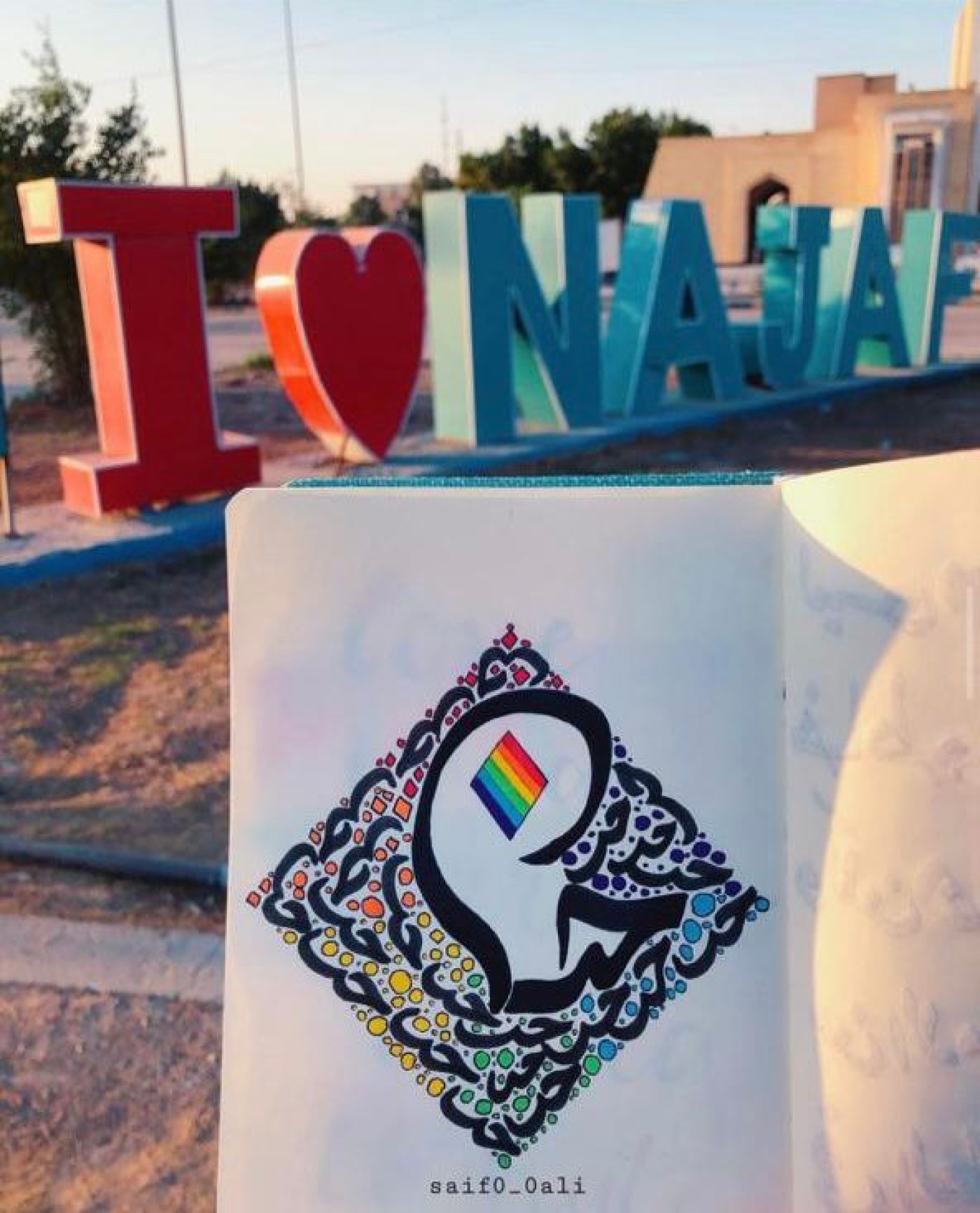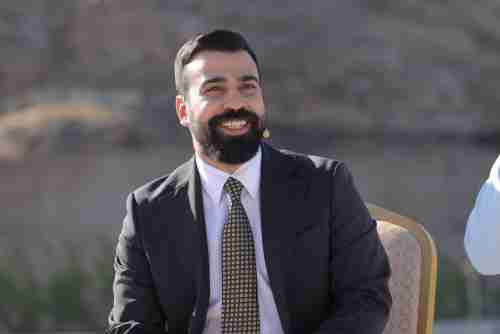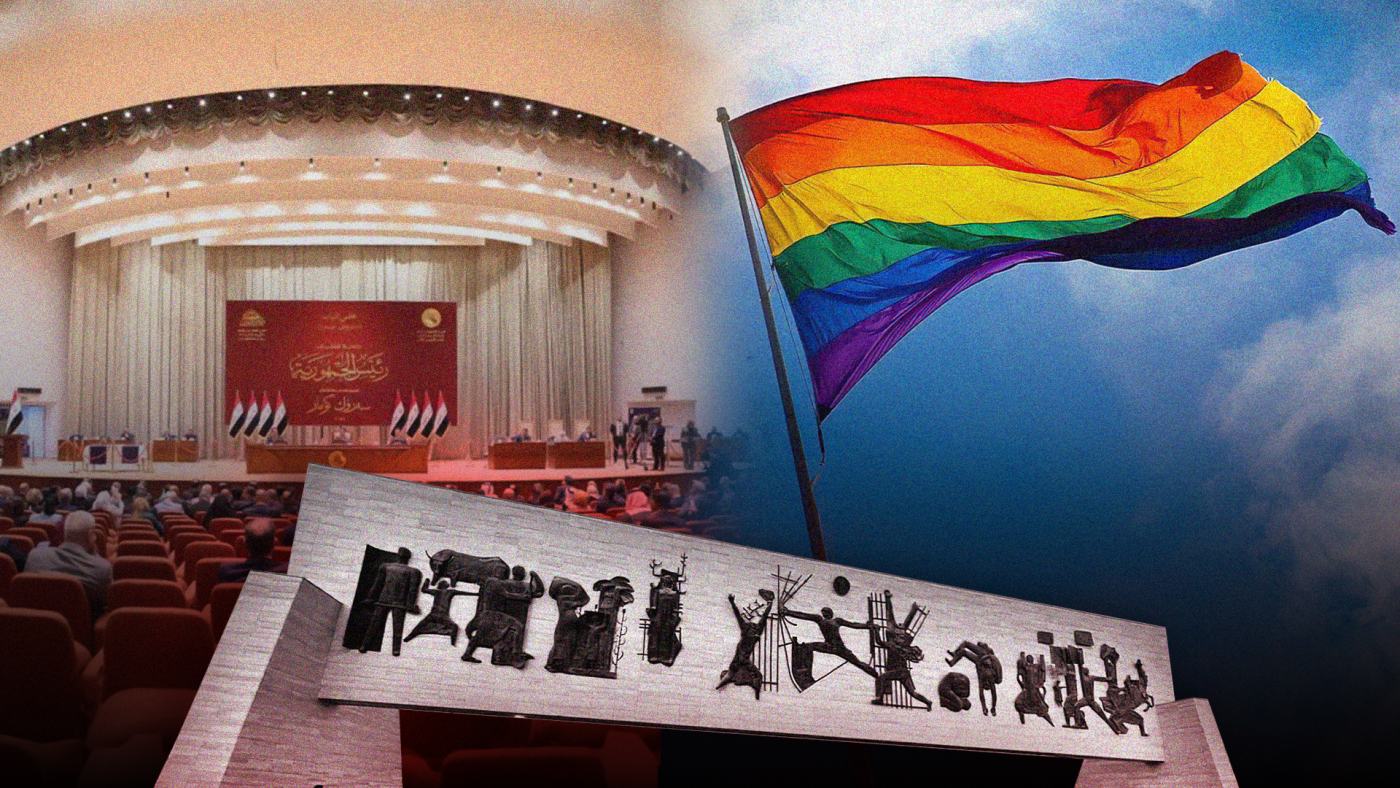ERBIL, Kurdistan Region of Iraq - Imagine being born gay in Iraq’s Shiite epicenter of Najaf, a city soaking in religious sacredness and strong antagonism towards the LGBT+ community. That is the story of 22-year-old Haydin*, who on Saturday found out that his country’s parliament had criminalized the little right he had to live freely as a gay man and that he could be put behind bars for up to 15 years.
Haydin realized he was gay when he was 18 years old. At the time, he was too afraid to be open about his discovery because he knew what awaited him in the brutal environment he lived in.
“I identified as straight, and I lived in a community that was hostile towards LGBT+ individuals, so I pretended to be homophobic to fit in,” Haydin told The New Region on Sunday.
Life had never been easy for Haydin and hundreds of Iraqis like him. Out of fear for their lives, some of the individuals in this piece, including Haydin, have been given an alias.
Haydin’s torment for being gay started officially when he was a university student.
“I started sharing news about the LGBT+ community and my daily life as a gay person on my Twitter account without showing my face,” he said. “However, with every post, I faced threats from people, including some from police and militia members.”
All hell broke loose when an honest misstep led to the reveal of his identity.
“Once, I posted some pictures without showing my face, but I did not realize the background revealed my college, which led to my identity being exposed by my college,” he recalled.
Following that event, he was summoned by the college’s administration, and several of his tweets had already been printed and shown to him; it was like a true investigation, he recalled.
“They threatened if I did not admit to being the person behind those posts, they would take the matter to court and inform my family,” he said.
Under duress, Haydin had to confess and offer a signed statement claiming ownership of the tweets he had made.
At first, he was suspended from school for a month, but two weeks later, he was informed that his suspension had been extended for the whole academic year, causing him to panic.
“I begged the university professors for a week until they told me to stop wearing suspicious clothes, cut my long hair, and trim my beard because I had brought a bad reputation to our department among other departments in the university,” Haydin recalled.
By then, it was his last year in university, and for the next few months, he would endure horrifying bullying and mistreatment from people on campus.
However, his torment did not end when he left the university, for the Iraqi public would not accept him either.
“I can say that half the time I go out, I am subjected to harassment, like a car stopping and the owner telling me to get in with him or being exposed to disgusting words while I walk,” he said.
Showing screenshots from the replies he would get on Twitter, one account replied to a tweet by Haydin saying that a gun would not suffice, he should instead be shot with a PK machine gun.
Replying to that, another account had said “it would be a shame to waste a bullet on him, a pistol bullet costs a thousand dinars and it is enough.”
Haydin had a chance to accept himself better when he met Saif Ali online.
Saif has been an Iraqi LGBT+ activist for years, using his several social media platforms to spread messages of love and acceptance.
When Saif first spoke to the author in 2022, he was still in Iraq, living in Najaf in secrecy.
Saif moved to Lebanon a year ago, when the threat against his life became imminent.
“I had to leave quickly for a long time, but I did not have my papers. They were with my family and they refused to give them to me,” Saif told The New Region on Sunday via WhatsApp. “But I can say that I was receiving threats on an almost daily basis from most of the Iraqi militias, in addition to the officers and members of the Iraqi military.”
“It was extremely difficult, but I had no choice, I had little money because I was working with a lot of queer organizations online, which helped me a lot, and now I am a refugee in Lebanon waiting for resettlement,” Saif added.

Saif is not the only member of the LGBT+ community who escaped the country.
Sam* is now 40 years old and lives in a country in the European Union. Originally from southern Iraq, he realized he was gay when he was 14 years old.
“Since then, I began to suffer because society and my family did not accept my sexuality, so I left my city in southern Iraq,” he told The New Region on Sunday. “I lived in one of the shelters provided by one of the organizations working in Baghdad, and I remained there for four years.”
Sam eventually decided to leave Iraq in 2018, when a message was delivered to his phone saying that if he continued to defend gay people, he would die.
“I received a message on my phone from an unknown number. It was telling me that if you continue to defend gay people, your head will be in the trash,” he said.
As a gay person who briefly experienced former Iraqi dictator Saddam Hussein’s tyranny, and witnessed the US invasion of the country firsthand, Sam was one of the many who thought the regime change would bring about better times.
“We felt that the situation would be better when American troops began to enter Iraq,” he said. “But in general, all the Iraqi people began to feel, day after day, that the situation was getting worse.”
“We cannot forget the campaigns launched against the LGBT+ community since 2009, which was taking place in the streets of Baghdad, and the state did not do anything to stop it,” Sam added, referring to a 2009 crackdown on the community during the reign of then Prime Minister Nouri al-Maliki.
According to Human Rights Watch (HRW), the crackdown ended in the death of hundreds of people.
The hopes of a better future soon died down and the situation continued to worsen.
The law
It was on Saturday when the news broke that the Iraqi parliament had officially approved a list of amendments to the 1988 Law on Combating Prostitution.
Under the new amendments, anyone engaging in a homosexual relationship could be sentenced to between 10 to 15 years in prison. The amendment had initially called for the application of the death penalty to such cases.
The amendments not only criminalize same-sex relationships, but also target patients and doctors going through sex reassignment surgeries, as well as activists and organizations defending LGBT+ rights in the country.
Haydin officially found himself as a wanted person for being himself, while both Saif and Sam are considered persona non grata in Iraq.
“I do not know how I felt, but I was not surprised because we are being exposed to killing, persecution, and marginalization without this amendment, but this amendment will add legal legitimacy to persecution, which will make the situation worse,” Haydin said about the moment he heard the news.
The feeling was very similar for Saif and Sam, as they had just realized they would not be able to return home.
“I feel very sad because I expected that I would be able to return to Iraq after years, even if my return was in the form of visits because Iraq is my country and I love it in the end, but this law, and because of my activism, means to me that I will be prohibited from entering the territory of Iraq at all times,” Saif said.
“I cannot even imagine it, because even though I am outside Iraq, it has a huge impact on my life, my work, and what I do,” he added. “I cannot imagine how members of the LGBT+ community would feel inside Iraq, especially since the vast majority of them have no ability to get out of it or to protect themselves.”
Sam felt the same way about the parliament’s decision.
“This law threatens the lives of dozens of members of the LGBT+ community in Iraq and turns their lives in Iraq into a jungle,” he said.
“The jungle might be kinder than that.”
He added that he had been receiving messages from the community inside Iraq, worrying for their lives.
“The enactment of this law also gave legitimacy to armed groups to continue their work in killing and threatening operations,” he said. “In the past, killings took place and the state claimed that it was unable to curb them, now there is a law.”
The Iraqi parliament passed the law just days after Prime Minister Mohammed Shia al-Sudani concluded his visit to the US. Many believe that if such a vote was undergone earlier, it would have displeased US officials and negatively affected the PM’s visit.
International community’s reaction
After the passing of the amendments, Iraqi MP Mustafa Sanad took to Twitter. He said that the amendments were passed despite pressures from 16 European countries and the US.
He added that the vote was initially delayed due to Sudani’s visit to Washington.
Speaking on the condition of anonymity with The New Region on Thursday, one Iraqi MP said that even if any MP did not want this amendment to pass, they would not be able to come forth publicly and denounce it given the stigma created around the topic.
However, the international community did not hesitate to express their worriedness about the topic.
“This amendment threatens those most at risk in Iraqi society. It can be used to hamper free speech and expression and inhibit the operations of NGOs across Iraq. The legislation also weakens Iraq’s ability to diversify its economy and attract foreign investment. International business coalitions have already indicated that such discrimination in Iraq will harm business and economic growth in the country,” read a statement from US State Department Spokesperson Matthew Miller.
The US Ambassador to Iraq shared the same statement.
The United States is deeply concerned by legislation passed today by the COR that threatens constitutionally protected human rights and fundamental freedoms. This action threatens those most at risk in Iraqi society. It can be used to further hamper free-speech and personal…
— Ambassador Alina L. Romanowski (@USAmbIraq) April 27, 2024
The UK expressed a similar sentiment regarding the passage of the amendments, with the British Foreign Minister labeling it as “dangerous”.
Amendments to Iraq’s Anti - Prostitution Law which criminalises LGBT people are dangerous and worrying. No one should be targeted for who they are. We encourage the Government of Iraq to uphold human rights and freedoms of all people without distinction.
— David Cameron (@David_Cameron) April 27, 2024
However, Iraq’s Ambassador to the UK was steadfast in replying, saying that Iraq has thousands of years of history and that the British minister should keep his advice to himself.
Saturday’s developments caused outrage amongst activists and rights watchdogs as well.
“I have been in this movement for nearly 15 years. If the Iraqi government thinks this is the end, they are mistaken,” Founder of IraQueer Amir Ashour told The New Region on Saturday. “Movements are not born overnight, and they are certainly not gonna die because a few random people who happen to have power now decided to misuse the law.”
“LGBT+ people are not going anywhere,” Ashour added.
HRW’s LGBTQI+ rights researcher Rasha Younes, expressed her discontent with the move as well.
“The Iraqi parliament’s passage of the anti-LGBT law rubber-stamps Iraq's appalling record of rights violations against LGBT people and is a serious blow to fundamental human rights, including the rights to freedom of expression and association, privacy, equality, and nondiscrimination,” Younes told The New Region on Saturday.
“The law adds insult to injury for Iraqi LGBT people already facing cyclical violence and threats to their lives by armed groups. The relentless recurrence of abuses against LGBT Iraqis, emanating from the family and stretching into every aspect of their public life, not only results in the death of LGBT people but makes their lives unlivable,” she added.
HRW in August called on the Iraqi government to withdraw the proposed law aiming to punish members of the LGBT+ community by death.
“Violence and discrimination against LGBT people are already rampant in Iraq,” the report read at the time.
Amnesty International’s Iraq researcher also spoke to The New Region regarding the amendments made.
“Members of the LGBTI community across Iraq are already subject to constant intimidation and violence at the hands of armed actors who operate with absolute impunity, maiming and killing in broad daylight,” Razaw Salihy said.
“The authorities have compounded this in turn by increasingly attacking LGBTI rights in their attempt to define and police ‘morality’. This has now culminated in these amendments that are an all-out attack on fundamental human rights,” she added.
However, little seems to be possible when it comes to changing the reality in Iraq, especially with religious and political figures backing the move.
Head of the Asaib Ahl al-Haq group Qais Khazali in a statement on Sunday welcomed the decision from the parliament, claiming that it was a crucial move at preserving Iraq’s cultural and Islamic values.
Exodus
With the law passed, there seems to be one option left for members of the LGBT+ community in Iraq, and that is leaving.
“I know that what I am saying will not please many people, especially members of the LGBT+ community who do not want to leave Iraq ever, but I see that life for members of the LGBT+ community in Iraq has become impossible, and they are unable to do anything,” Saif said, adding that the passage of the law will likely come with extensive hate campaigns.
“I believe that the best thing that can be done is for some countries to establish rapid asylum programs, such as what happened to Afghanistan and Uganda,” he added.
A similar sentiment was shared by Sam as well.
“I believe that enacting this law will contribute to the migration of dozens of gay people out of Iraq, fearing for their lives,” Sam said. “There are no guarantees for them in Iraq. The law was written professionally so that no one escapes punishment, whether he is an individual from the LGBT+ community, an activist defending them, or an organization.”
For Haydin, who is already stuck in Iraq, the future has never felt darker.
“For me I do not imagine myself staying in Iraq at all,” he said. “I have been working for months since I graduated just to save money and flee Iraq, my friends as well, all of us have been waiting for graduation just to get out of Iraq.”
*Names have been changed to protect their identity
Dilan Sirwan is an Iraqi-Kurdish journalist who has extensively covered the issues and rights of the LGBT+ community in Iraq.



 Facebook
Facebook
 LinkedIn
LinkedIn
 Telegram
Telegram
 X
X


